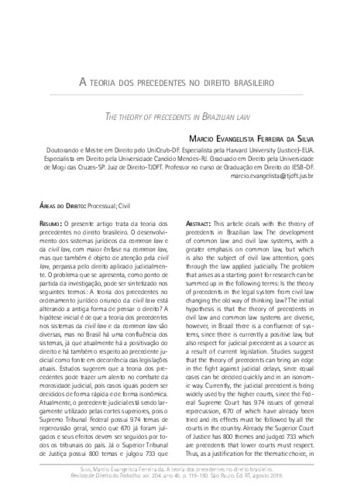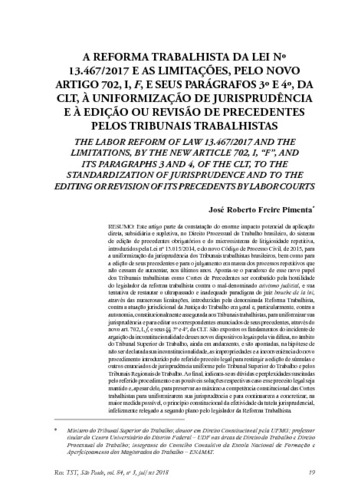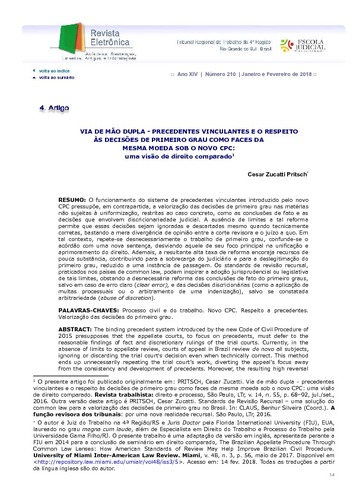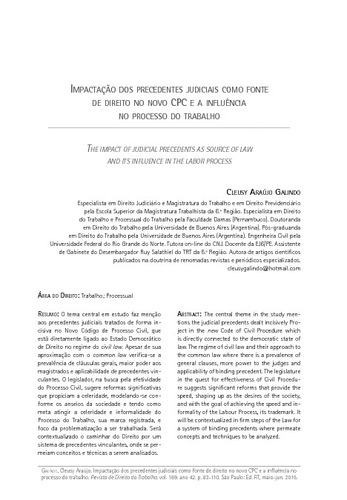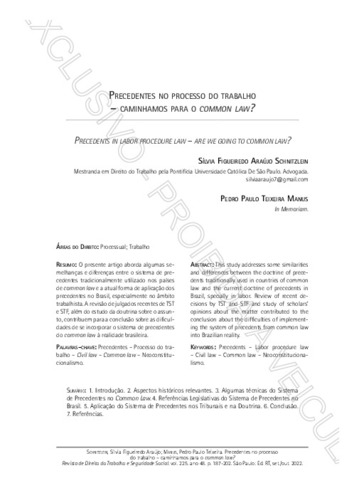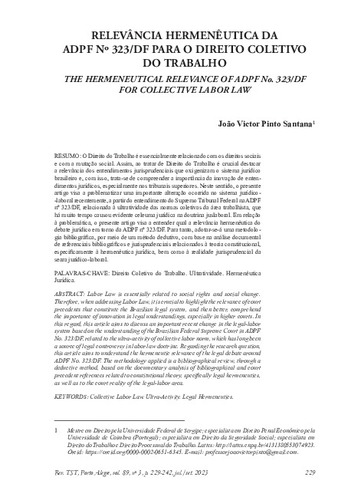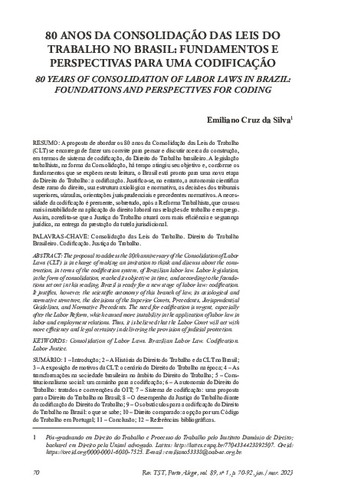Artigo de periódico
A teoria dos precedentes no direito brasileiro
| dc.contributor.author | Silva, Marcio Evangelista Ferreira da | |
| dc.date.accessioned | 2019-11-22T17:36:38Z | |
| dc.date.available | 2019-11-22T17:36:38Z | |
| dc.date.issued | 2019-08 | |
| dc.identifier.citation | SILVA, Marcio Evangelista Ferreira da. A teoria dos precedentes no direito brasileiro = The theory of precedents in Brazilian law. Revista de direito do trabalho, São Paulo, v. 45, n. 204, p. 119-150, ago. 2019. | pt_BR |
| dc.identifier.uri | https://hdl.handle.net/20.500.12178/165094 | |
| dc.description.abstract | [por] Trata da teoria dos precedentes no direito brasileiro. O desenvolvimento dos sistemas jurídicos da common law e da civil law, com maior ênfase na common law, mas que também é objeto de atenção pela civil law, perpassa pelo direito aplicado judicialmente. O problema que se apresenta, como ponto de partida da investigação, pode ser sintetizado nos seguintes termos: A teoria dos precedentes no ordenamento jurídico oriundo da civil law está alterando a antiga forma de pensar o direito? A hipótese inicial é de que a teoria dos precedentes nos sistemas da civil law e da common law são diversas, mas no Brasil há uma confluência dos sistemas, já que atualmente há a positivação do direito e há também o respeito ao precedente judicial como fonte em decorrência das legislações atuais. Estudos sugerem que a teoria dos precedentes pode trazer um alento no combate da morosidade judicial, pois casos iguais podem ser decididos de forma rápida e de forma isonômica. Atualmente, o precedente judicial está sendo largamente utilizado pelas cortes superiores, pois o Supremo Tribunal Federal possui 974 temas de repercussão geral, sendo que 670 já foram julgados e seus efeitos devem ser seguidos por todos os tribunais do país. Já o Superior Tribunal de Justiça possui 800 temas e julgou 733, que são precedentes a que os tribunais inferiores devem respeitar. Assim, a título de justificativa pela escolha temática, no direito inglês foi conferido grande valor ao precedente judicial, inclusive, as decisões judiciais são consideradas responsáveis pelo desenvolvimento do direito. Ademais, sustenta-se que só houve evolução coerente do direito pelo fato de que os juízes reconheceram as regras estipuladas nos casos anteriores. Destarte, nota-se que a importância do tema é latente, pois havendo uma teoria de precedentes forte no direito, seja qual for o sistema, o ideal de igualdade será cumprido e, como é cediço, a igualdade é um componente na concepção de justiça, bem como a essência de sua prática. Para o desiderato acima apontado é necessário investigar-se como a literatura especializada do direito aborda a temática dos precedentes judiciais no direito brasileiro. Tem-se o intuito, também, de comprovar que o sistema de precedentes apresenta uma estrutura que propicia maior segurança jurídica ao ordenamento jurídico. Para tanto, aborda-se, inicialmente, a literatura do precedente judicial, posteriormente, a diferença entre precedente e jurisprudência e, na sequência, a teoria dos precedentes no direito brasileiro. Ao final, são apresentadas as considerações finais para responder à problemática apresentada, e se a hipótese restou confirmada ou refutada. | pt_BR |
| dc.description.abstract | [eng] This article deals with the theory of precedents in Brazilian law. The development of common law and civil law systems, with a greater emphasis on common law, but which is also the subject of civil law attention, goes through the law applied judicially. The problem that arises as a starting point for research can be summed up in the following terms: Is the theory of precedents in the legal system from civil law changing the old way of thinking law? The initial hypothesis is that the theory of precedents in civil law and common law systems are diverse, however, in Brazil there is a confluence of systems, since there is currently a positive law, but also respect for judicial precedent as a source as a result of current legislation. Studies suggest that the theory of precedents can bring an edge in the fight against judicial delays, since equal cases can be decided quickly and in an isonomic way. Currently, the judicial precedent is being widely used by the higher courts, since the Federal Supreme Court has 974 issues of general repercussion, 670 of which have already been tried and its effects must be followed by all the courts in the country. Already the Superior Court of Justice has 800 themes and judged 733 which are precedents that lower courts must respect. Thus, as a justification for the thematic choice, in English law great value was given to the judicial precedent, including judicial decisions are considered responsible for the development of law. In addition, it is maintained that there was only coherent evolution of the law because the judges recognized the rules stipulated in the previous cases. Thus, it is noted that the importance of the theme is latent, since there is a strong theory of precedents in law, whatever the system, the ideal of equality will be fulfilled and, as it is, equality is a component in the conception of justice, as well as the essence of their practice. For the above mentioned aim it is necessary to investigate how the specialized literature of the law addresses the issue of judicial precedents in Brazilian law. It is also intended to prove that the precedence system has a structure that provides greater legal certainty to the legal system. In order to do so, the literature on the judicial precedent, the difference between precedent and jurisprudence, and, as a consequence, the theory of precedents in Brazilian law are initially addressed. At the end, the final considerations are presented to answer the presented problem, and if the hypothesis has been confirmed or refuted. | pt_BR |
| dc.description.tableofcontents | A importância da teoria dos precedentes -- Precedente vs. jurisprudência -- O precedente no direito brasileiro | pt_BR |
| dc.language.iso | pt_BR | pt_BR |
| dc.relation.ispartof | Revista de direito do trabalho: vol. 45, n. 204 (ago. 2019) | pt_BR |
| dc.subject | Efeito vinculante | pt_BR |
| dc.subject | Common law | pt_BR |
| dc.subject | Decisão judicial | pt_BR |
| dc.subject | Jurisprudência | pt_BR |
| dc.subject | Súmula vinculante | pt_BR |
| dc.title | A teoria dos precedentes no direito brasileiro | pt_BR |
| dc.title.alternative | The theory of precedents in Brazilian law | pt_BR |
| dc.type.genre | Artigo de periódico | pt_BR |
| dc.identifier.rvbisys | 001157005 | |
| dc.relation.ispartoflink | https://hdl.handle.net/20.500.12178/164635 | pt_BR |
Coleção
-
Artigos9566


